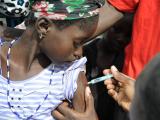May 24, 2012 (CIDRAP News) – Meningococcal disease outbreaks in Africa this year have spread to five more countries, sickening nearly 12,000 people and killing almost 1,000, the World Health Organization (WHO) said today.
Enhanced surveillance has found that the disease has now struck 10 of 14 countries in Africa's "meningitis belt," affecting Benin, Burkina Faso, Chad, Central African Republic, Ivory Coast, Gambia, Ghana, Mali, Nigeria and Sudan, according to a WHO statement. The WHO's last update in March reported only five affected countries.
The WHO said as of Apr 17 the countries have reported 11,647 cases, including 960 deaths, for a case-fatality rate (CFR) of 8.2%. The numbers reflect an increase of 4,962 cases and 321 cases since the agency's last report. Outbreaks have mainly been caused by the W135 serogroup of Neisseria meningitides.
Country health ministries have implemented prevention and control strategies, including enhanced surveillance, public information campaigns, intensified case management, and cross-border collaboration, the WHO said.
In response to the outbreaks, the International Coordinating Group on Vaccine Provision for Epidemic Meningitis Control (ICG) has released 11,000 vials of antibiotic and 1,665,673 doses of vaccine to six countries most affected by the epidemics, based on their requests: Benin, Burkina Faso, Chad, Ivory Coast, Ghana, and Sudan.
The ICG is working with vaccine manufacturers and partners to see that stockpiles of appropriate vaccine are adequate for responding to future outbreaks, the WHO said.
Meningococcal disease epidemics in Africa occur at 7- to 14-year intervals, according to background information from the WHO. In 2009, 14 countries reported a total of 88,199 cases, including 5,352 deaths (a 6.1% CFR).
In a related development, French public health officials today reported 16 cases of meningococcal disease infection as of Apr 1, with half of them imported from sub-Saharan Africa, an increase from the previous 5 years. The group detailed its findings in Eurosurveillance.
The officials said all of the cases were lab confirmed and involved the W135 serogroup, which is fairly rare in France. Typically, only 4 to 8 W135 cases are reported by the end of May, they said.
The first two cases were reported in February when the meningitis epidemic season in Africa, which runs between December and June, had already begun. The patients were from separate French regions and had visited the same area of Senegal during their work with nongovernmental organizations. No connections were found between the two patients.
Half of the 16 patients had links to Africa travel or had contact with someone who traveled to Africa. Investigators said 3 of the 8 cases have incubation and illness onsets that make them imported cases, and the 5 other cases could have been infected by asymptomatic contacts. No deaths were reported.
The authors urged that European officials enhance surveillance for the disease, and they said the findings underscore the importance of French recommendations that travelers to West African countries in the meningitis belt be vaccinated with the quadrivalent W135 vaccine.
See also:
May 24 WHO statement
WHO background information on meningococcal meningitis
May 24 Eurosurveillance report


















